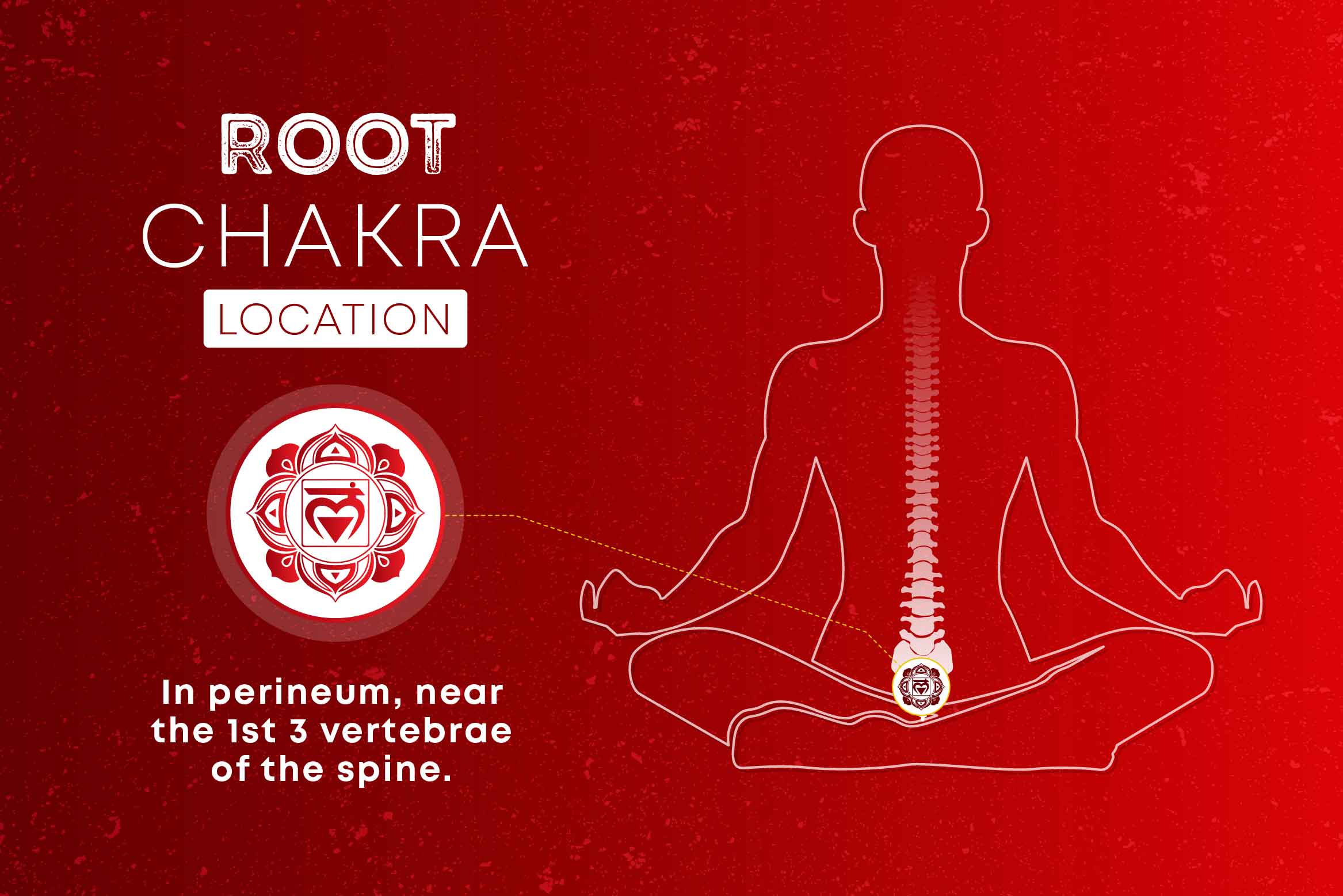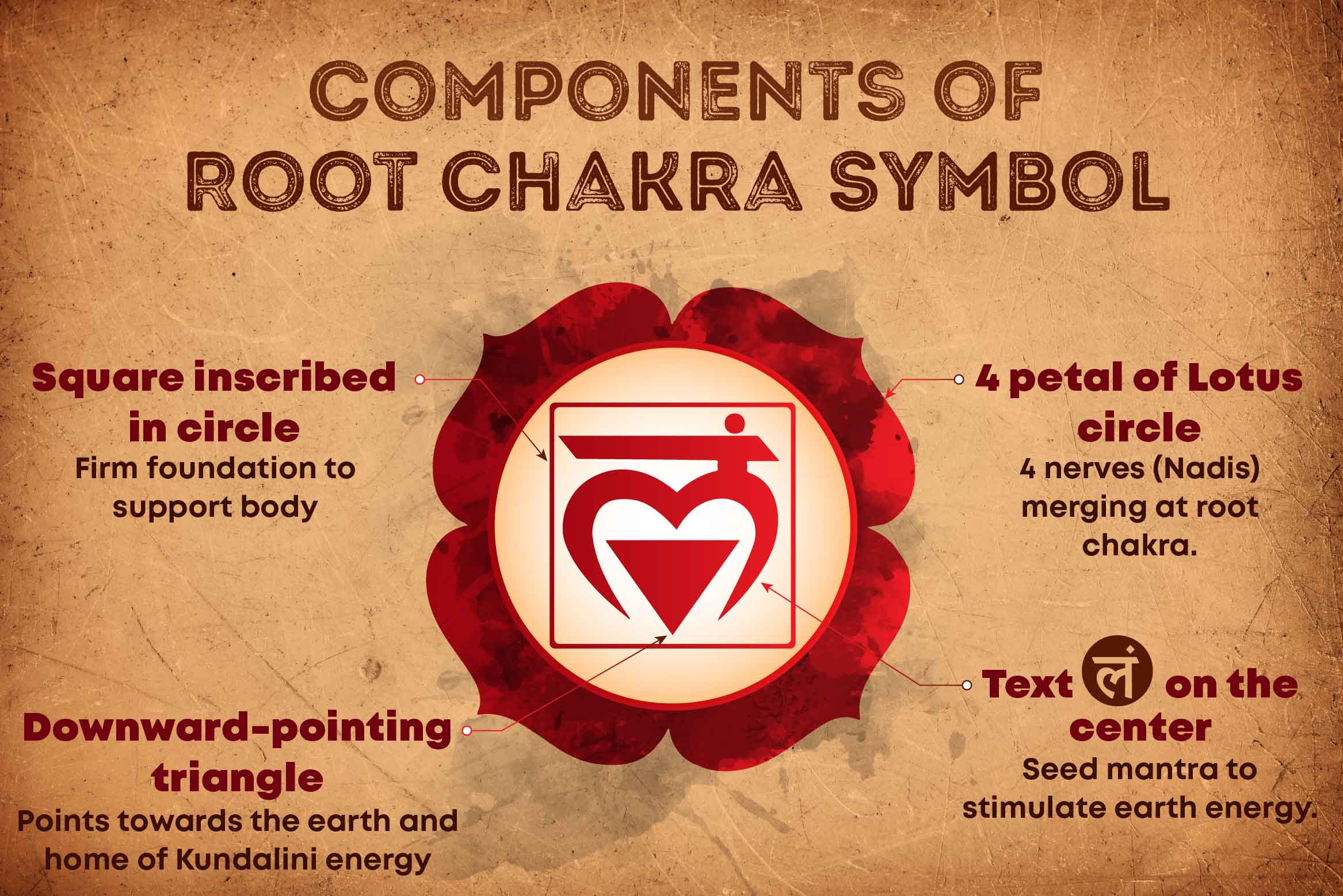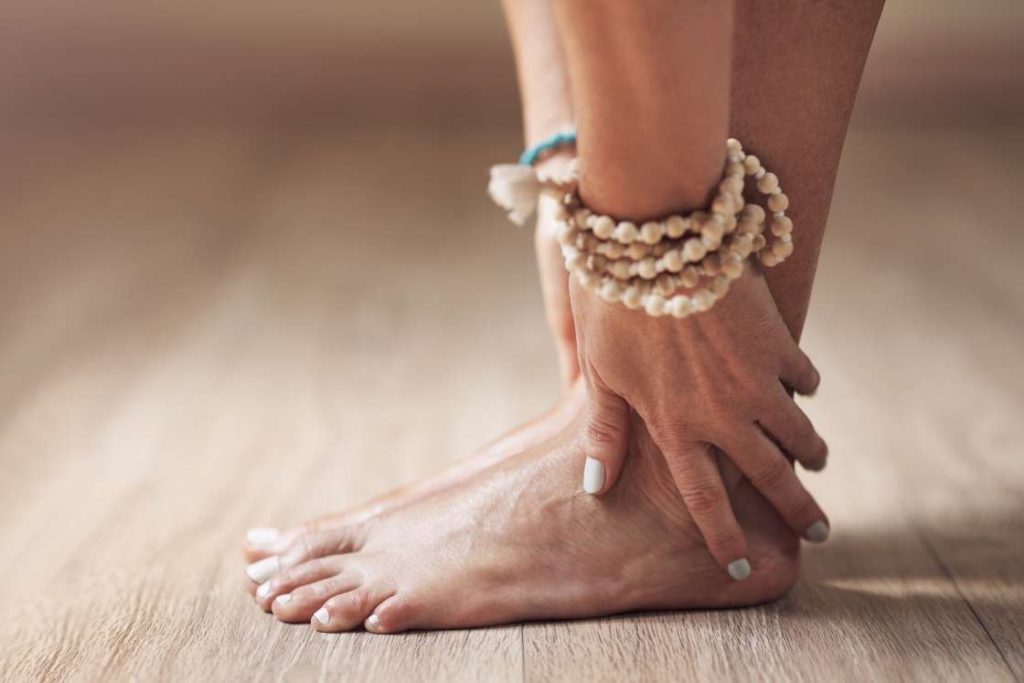- Meaning
- Location
- Color
- Symbol
- Characteristics
- Balance root chakra
- Imbalance root chakra
- How to Balance?

The Root Chakra at a Glance
| Sanskrit Name | Muladhara |
| Location | The base of the spine, the pelvic floor. |
| Color | Red |
| Seed Mantra | Lam |
| Element | Earth |
| Qualities | Stability, survival instinct, and security |
| Signs of balance | Full of vitality, fearlessness, and sense of belonging |
| Signs of imbalance | Fatigue, constipation, fear, anxiety, lack, and instability |
What is Root Chakra?
The root chakra is the first of 7 chakras present at the base of the spine in our subtle body. Being the first and base chakra, the energy of this chakra works like the foundation for all the above chakras.
In Sanskrit, the root chakra is known as Muladhara. The term Muladhara comes from the prefix mula, meaning “root,” and adhara, meaning “support” or “base.” It’s called Muladhara because the development of this chakra begins at the conception date and it provides a supportive foundation to develop the spine and other body organs.
When you feel a sense of instability for the basic survival needs like food and shelter or you don’t trust anyone other than yourself only, it indicates the problem in your root chakra.
The root chakra is an instinctual energy center. It means everything we need to survive and evolve on this earth like a sense of safety and security (fight-flight, or freeze response), our basic needs, and emotional needs are initiated from the root chakra. When these instinctual needs are met, root chakra happens in its balanced form and you feel grounded and safe.
The root chakra is the energy centre related to safety, survival, and grounding. When balanced, it supports stability and confidence. When imbalanced, fear and insecurity dominate.
Where exactly is root chakra located?

The root chakra is located in the pelvic floor, exactly at the tailbone, where 3 vertebrae fuse to produce a triangular shape area. In the subtle body, your root chakra present at the center of this small area.
Physically you can be aware of root chakra location by placing your hands (finger pointing downwards) at the tailbone. The point where your downward-pointing little finger touches the pelvic floor is the location of your root chakra.
In females, the location of the root chakra consists in the center of the anus and vagina. It lies posterior to the genital organ i.e. cervix. While in males, this chakra occupies the area above the perineum or lies inside it.
What is the color of root chakra?
The color of energy that radiates from the root chakra is red. It’s because this chakra has the closest vicinity to the earth element and the red color shows a reflection of the earth’s inner surface and core.
The reason for the red color of the root chakra is that red is the color of energy and determination that stimulates the limbic system of the brain. The limbic system governs behavior we need for survival: feeding, reproduction, and fight or flight response.
Moreover, the red color also denotes how much we are connected to the earth. Being connected to earth means how well you are aware of yourself. The more you aware of yourself, the more you would come to know how less your basic needs are and this is what the work of a balanced root chakra is.
Also Read: 7 Chakra Colors and & Science Behind Them
What does root chakra symbol shows?

The symbol of root chakra contains 4 simple components; downward-pointing triangle, square, lotus petals and text lam at the center.
- Downward-pointing triangle – It points towards the earth and home of kundalini shakti present in this chakra. Also, the downward arrow reminds us to be grounded and connected to the earth.
- Square inscribed in a circle – Square shown in the root chakra symbol is the representation of a firm foundation to support everything. Earth being the element of root chakra provides us that firm foundation.
- Lotus flower 4 petals – 4 lotus petals represents the connection between Nadis and chakras. It indicates the merging of 4 nerves (Nadis) at the root chakra. These 4 Nadis in the symbol represented with 4 Sanskrit syllables वं (vaṃ), शं (śaṃ), षं (ṣaṃ), and सं (saṃ).
- Text लं on the center – “Lam” is the ‘Bija Mantra’ (seed mantra) of the root chakra. Its sound has the power to stimulate the earth element and so the root chakra.
According to Kundalini Tantra (Yoga Publications Trust), repeated chanting of the seed-mantra associated with Muladhara helps awaken the latent energy and aligns the practitioner toward deeper spiritual growth.
Some textual reference shows the symbol of root chakra with an elephant picture within the square. The elephant is a representation of mother earth bearing the weight and hence symbolizes the inner strength associated with this chakra.
Key characteristics of the root chakra
Root chakra governs the following functions in our body;
- It creates a firm foundation and grounded us by nurturing lower body parts like feet, legs, and hip flexors in conjunction with the minor chakras.
- Being centered at the mid-section of our body, the root chakra controls the functioning of skeleton bones, Kidneys, colon, adrenal glands, bladder, and arterial blood flow to the left chamber of the heart.
- Root chakra locates at the place where kundalini energy lies in the dormant state. In spiritual language, awakened Kundalini or open root chakra is considered the gate for higher energy.
- The Muladhara chakra has instinctual characteristics that control our animal nature and governed by the predominant survival sense of smell and taste.
In classical yogic philosophy, Muladhara is considered the foundation from which higher awareness and spiritual growth can safely unfold.
How to know if the root chakra is balanced?

When the root chakra is spinning at a balanced rate, it radiates energy in all aspects of a person’s life. You are more involved in activities that explore your physical and emotional side. Hence you impart positive vibrations just like a winner in all walks of life.
The signs of a balanced root chakra are;
- Full of vitality and passion – In a balanced root chakra state, you are more passionate about whatever you do. You would experience vitality and feeling of the responsibility for your work, family, and friends.
- Satisfaction with survival needs – You tend to be more satisfied while striving to meet the needs of surviving.
- Connected with core values – Balanced root chakra is all about governing the force of being grounded. Hence, the person with a balanced root chakra would be connected with the core values of life.
- Equanimity of logic and emotion – When your root chakra is balanced, it helps you to keep your mind equally drawn to the logic and emotion in something you are more active.
- Fearless personality – A person having Root Chakra aligned feels to be fearless and prepared for physical, financial, moral, and psychological tasks.
How to know if the root chakra is imbalanced?

When root chakra happens to out of balance, a sense of incompleteness and retreated from everything takes place in the person.
Imbalance in root chakra appears in two ways – under-activity and overactivity.
1. When Root Chakra is Under-active
In case of under-active root chakra imbalance,
- You feel taken down by depression, withdraw from whatever you plan or intend to do.
- There is more possibility that you grow vague feelings about your insecurity and start leading a life of a loner.
- The more you lack the energy, the harder is to trust others. This makes you more self-centered. This leads you to live aloof being disconnected from the earth and the surroundings.
2. When Root Chakra is Overactive
Overactive root chakra makes you overconfident, which eventually ends up developing the following signs.
- Overflow of root chakra energy may lead you to disconnect from the basic notion that you are an earthly creature.
- You become possessive, tend to attach too much to the people or things that make you more rigid physically and psychologically.
- Being short-tempered, angry, belligerent, and greedy are some common traits of being an overactive root chakra.
What causes the root chakra imbalance?
The imbalance of root chakra may happen because of an old accident or regular activity you are most feared of. A trauma that has been affecting you from a long time (Childhood Trauma) could lead to an under-active root chakra.
Moreover, some general causes of root chakra imbalance are;
- A toxic relationship
- Longtime illness
- Abuse at an early age
- Mounting fear
- Abandonment in relationships
- Have been in relative poverty or
- Lack of empathy for your family.
Problems caused by imbalanced root chakra
Root chakra manifests its imbalance by means of different physical and psychological problems. You might face the following problems when your root chakra is in an imbalanced state.
1. Physical Problems
As physically root chakra locates in the pelvic area, it shows the main problems related to the bladder, kidney, lower spine, adrenal glands, prostate, hip flexors, and leg joints.
Some physical problems caused by imbalanced root chakra are irregular menstruation in females, blood diseases, constipation, diarrhea, piles, hemorrhoids, colitis, prostate cancer, glaucoma, and kidney diseases, and pain in the feet.
2. Psychological Problems
Psychologically, when the root chakra is imbalanced, you are more addicted and indulgence in any external agency for instant happiness.
Other psychological problems caused by imbalanced root chakra are Irritation, eating disorders, depression, hypertension, money addiction, migraines, and stubborn behavior.
An imbalanced root chakra does not mean something is “wrong” with you it simply reflects unmet needs for safety or grounding.
How to balance root chakra?

Your root chakra is very easy to prone out of balance as it’s the bridge between us and the external world. The number of external agencies can influence it but simultaneously some little efforts are enough to balance it.
You can follow the following practices if you are facing any problems associated with the root chakra.
1. Do Meditation with Mantras and Mudras
One of the common causes of the disturbed root chakra is when you are not grounded, in both senses physically and psychologically.
Meditation, besides, introducing you to your inner dimension, also helps you to connect with the ground.
Although many meditation practices are available to bring your root energy in balance but a focused seated asana with mantra chant and mudras for meditation is the easiest one.
Choose a silent place and follow this small meditation practice to balance your root chakra.
- Sit in padmasana (lotus pose). Make Gyan mudra or Earth mudra with your hands.
- Bring your awareness down at the physical location of the root chakra and imagine a connection establishing between the pelvic floor and earth.
- To make the connection more effective, chant the seed mantra ‘Lam‘ vocally or subvocally. Vibrations induced out of mantra chanting stimulates root energy and thus balancing becomes easier.
- As the nose is the sense of organ of the root chakra, you can also meditate on the nose tip in seated asana to balance root energy.
2. Ground yourself with yoga poses
Physical exercise is another simplest approach you can opt to bring your root energy in balance.
In yoga, asana balances ease and effort and thus, a better alternate of physical exercises.
A few yoga poses which focus on energy associated with the root chakra are Pavanamuktasana (wind-relieving pose), padmasana (lotus pose), malasana (garland pose), tadasana (mountain pose), and virabhadrasana 2 (warrior pose 2).
You can practice yoga poses on green grass to feel more connected to the ground. It balances root chakra energy by strengthening lower legs, thighs, enhances hips mobility, and relieves back pain.
Best Yoga Poses for Root Chakra to Feel Grounded and Balanced
3. Harness the energy of stones
Some stones and crystals have the vibrating frequency to restore the balance of your Root Chakra. The root chakra vibrates at the lowest frequency of 396Hz.
Since the Muladhara Chakra is linked with Red Colour, Red-colored stones are resonant with Root Chakra. These are Red Jasper, Bloodstone, and Red Carnelian. With each stone possessing different characteristics, their symbolic significance on the Root Chakra is also different.
- You can wear Red Carnelian for Root Chakra which represents strength & courage and is used to cleanse & activate the Chakra.
- Red Jasper for Root Chakra is commonly known for cleansing and bringing the wheel to a balanced state. You can wear it in the state of deficient or overactive Root Chakra.
- Bloodstone for Root Chakra is suitable for you if you have shrunk your self-esteem and are working towards pushing the negative vibes out of you.
Also Read: 10 Powerful Root Chakra Crystals for Healing
4. Nourish yourself with green veggies
Since the deficiency in Root Chakra is caused due to less interaction with the earth, whether directly or indirectly. It is time you tasted some earthly delights to balance your first wheel.
You can add green and root vegetables to your diet plan to start over a restoration chapter. Some of the vegetables are Beets, onion, Garlic, Tomatoes, Potatoes, carrots, radishes, and beetroots.
Conclusion
It is not hard to say when or how your Root Chakra gets out of alignment. Each state represents its different symptoms and causes. All you can do is to focus inwards to stay grounded and vibrant. This state can only be achieved through Meditation, Correct Mudras, wearing suitable Stones, and following earthly red foods.





What are the essential oils you can use to balance the chakras
You can check this article
Going by the Article about Muladhara chakra , my Muladhara chakra is Overactive. Both Physical and mental symptoms confirm this. Pl guide me to balance the Chakra thru Yoga and Mudra.
this is very helpful, thank you so much!
Hi Rishita, it’s a very good article thank you. I miss the fact that the hearing is already present in fetal state:
Basic needs are developed from conception. The body is built up cells grow and work together touch (feeling) and hearing is developed first. Security in the womb is important and the emotions of the mother have an influence. After birth, an “attack” is committed on feeling and hearing. Immediately afterward the baby has to breathe independently and the nose is activated. smell and taste are also associated with the nose, but this is not yet conscious.
Can you tell me if I’m on the right track?
thank you
Hello Rishita,
the literature is just superb. it is a great service that have done to the humanity.
i would love to buy all of your publications on
1 – Mudras and balanced health
2 – chakras
3 – any publications on kriyas that we are expected to perform daily
also, if we can rejuvinate ourselves in any of your Ayur-shalas, happy to be there
Hello Pramod, thanks for showing interest but currently I haven’t published any publications on the topics you mentioned. Also, we would let you know about Ayur-shalas in the future through email.
Loved this, any chance you would do all of the chakras in this format??? I only found a few others on this site.
Hi Ben, I am glad you loved this article. We have covered other chakras also in the same format. Please refer the following link https://fitsri.com/tag/chakras/